eBay & Ex-Execs Make Last-Ditch Effort To Escape Liability For 2019 Cyberstalking Scandal
eBay and ex-execs Devin Wenig, Steve Wymer and Wendy Jones try to duck liability in 2019 cyberstalking scandal, seeking to have claims thrown out on summary judgement before ongoing civil case heads to trial.
The bizarre corporate plot unfolded in the summer of 2019, targeting Ina and David Steiner for their reporting on eBay at EcommerceBytes and seeking to unmask the identity of unsuckEBAY (also known as FidoMaster/Dan Davis) an anonymous commenter and source who also sparked the ire of top executives at the company.
Court records revealed sordid details of the harassment that included disturbing deliveries of live insects, bloody pig masks and funeral wreaths as well as threatening messages, doxxing that ultimately escalated to in-person stalking and an attempted break-in at the hands of high-level eBay security personnel.
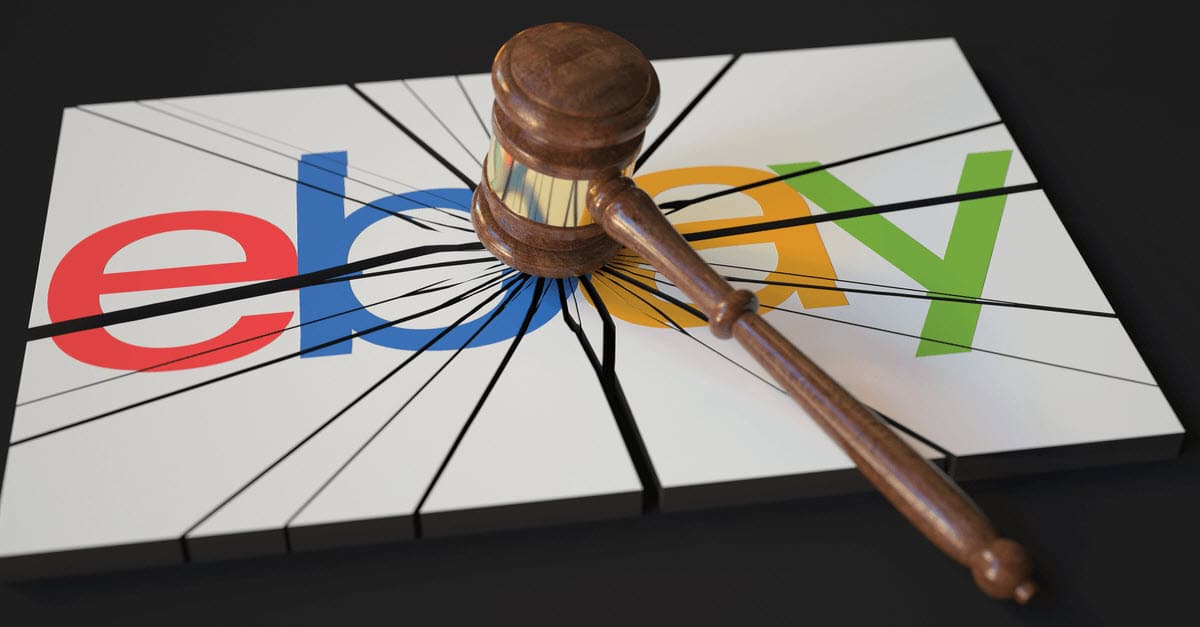
Sr Director Security Jim Baugh, Director of Global Resiliency David Harville, Security Manager Philip Cooke, Sr Manager Special Operations Brian Gilbert, Sr Manager Global Intelligence Stephanie Popp, Global Intelligence Manager Stephanie Stockwell, and Security Analyst Veronica Zea all pleaded guilty and have been sentenced for their roles in these crimes.
eBay signed a deferred prosecution agreement with the Department of Justice that forced the company to admit to a detailed recitation of all the relevant facts involving six felony offenses with eBay paying a $3 Million fine and undergoing 3 years of enhanced compliance monitoring in order to avoid further criminal prosecution related to this matter.
But importantly, that $3 Million was paid to the US Treasury, not the victims, leaving the Steiners to pursue compensation through the civil court system.
The ongoing lawsuit names the seven criminal defendants plus eBay, ex-CEO Devin Wenig, ex-Communications Chief Steve Wymer, ex-SVP Global Operations Wendy Jones, and security company Progressive F.O.R.C.E Concepts (PFC), claiming direction and support for the harassment came from the very top of eBay's c-suite.
The Steiners originally sought $700 Million in total damages, which has now been reduced to $500 Million after some claims for punitive damages were dismissed while others were allowed to move forward following a November ruling by Judge Patti Saris.
Lawyers for eBay and the executive defendants filed motions for summary judgement last week, arguing Judge Saris should not allow certain claims to be heard by a jury and should instead issue immediate rulings to dismiss some or all of the Steiners' claims.
The claims against the 7 criminal defendants are fairly straight forward - they pleaded guilty for their parts in the federal felonies and while there may be arguments to be made about their individual degrees of liability, there's no question they are appropriately named in this suit.
Linking the criminal activity to communications from the named executives is a more difficult task, and eBay and those defendants argue the plaintiffs have not adequately made their case, saying their comments were either hyperbole, taken out of context by Baugh, or referred to legal communications or PR strategies, not an encouragement or directive to engage in criminal activity.
Beyond the emails and text messages which have been entered into evidence, the plaintiffs rely heavily on statements made in the various criminal defendants' sentencing memos - and that's where eBay and the executive defendants have focused their arguments for summary judgement, saying those statements are inadmissible hearsay.
Wenig's lawyers argue the plaintiffs have presented no admissible evidence or persuasive legal arguments showing why he should be held liable for the actions of the criminal defendants, so summary judgement should dismiss all claims against him.
There is no cognizable legal or factual basis to hold Devin Wenig liable for the reprehensible actions the Criminal Defendants unleashed on Plaintiffs in their Natick home. Plaintiffs have neither admissible evidence nor persuasive legal arguments to change that reality.
Despite doggedly seeking, for more than five years, a hook to pull Mr. Wenig into the camp of those who wronged them, Plaintiffs’ case is still based on the same two communications strategy texts that they trumpeted when they brought the case years ago.
Along the way, Plaintiffs have made stigmatizing allegations against Mr. Wenig at every turn, appearing in films and documentaries and trying their case in the press.
This is no coincidence: the court of public opinion is not bound by the rules of evidence, and rumor and innuendo, particularly about corporate executives, is accepted and embraced. But we are not in the court of public opinion, and these are not the actions of litigants confident they can win on the facts and the law.
The facts and law are paramount here, and summary judgment motions are the exact antidote to this type of strategy.
Plaintiffs have had access to scores of percipient witnesses and hundreds of thousands of pages of documents. They have engaged at least three expert witnesses and five law firms, all in an effort to make a case that even the federal government, with all its resources, concluded was not viable...
...To avoid summary judgment, Plaintiffs must present viable claims supported by admissible evidence sufficient to raise a genuine issue of fact for trial. Plaintiffs’ claims are plainly deficient as a matter of law. Nor are there any material issues of disputed fact. Accordingly, summary judgment is appropriate.
Rather than face that inevitability, Plaintiffs opt to introduce an additional 110 paragraphs of “material undisputed facts” (“SPUF”) and 115 exhibits which they claim preclude summary judgment.
Plaintiffs are wrong..."It is black-letter law that hearsay evidence cannot be considered on summary judgment.”...Myriad documents cited in the SPUF—namely five sets of interview notes, eBay’s Deferred Prosecution Agreement, Mr. Baugh’s sentencing memorandum, and Ms. Zea’s sentencing letter —and the corresponding “facts” upon which they are based should be excluded on this basis.
Wymer's motion for summary judgement uses many of the same arguments, admitting some of his language was "animated" but did not constitute direct involvement in the threats or harassment carried out by the criminal defendants.
Plaintiffs’ Opposition confirms the absence of competent evidence that Wymer knowingly participated in or assisted the Charged Defendants’ crimes. Plaintiffs concede that Wymer did not personally participate in any of the acts that harmed them, which itself requires summary judgment for Wymer on Plaintiffs’ direct tort claims.
They concede (or cite nothing to dispute) that Wymer was absent when the Charged Defendants planned and executed their crimes, and that no Charged Defendant who worked for Jim Baugh told Wymer of their criminal plans. No witness testified that they told Wymer what the Charged Defendants were planning; no document reflects Wymer receiving this information until after the fact.
Lacking competent evidence to tie Wymer to the Charged Defendants’ crimes, the Opposition relies on inadmissible hearsay and characterizations of Wymer’s messages that are contrary to the record. Although the Opposition references supposed “directives,” none of Wymer’s messages to Baugh say anything about threatening, harassing, or imprisoning Plaintiffs.
On their face, many of Wymer’s messages responded to questions about countering Plaintiffs’ website, which is not the same as flying across the country to inflict personal harm. Although some messages used animated language, it is undisputed that Wymer used such language frequently in many settings, which makes it implausible to infer unlawful intent exclusively from tone.
Plaintiffs try to plug this hole by repeatedly citing allegations in a sentencing memorandum filed by Baugh’s attorneys, among other inadmissible evidence. Plaintiffs cite Baugh’s sentencing memorandum as their sole proof for allegations about purported verbal discussions that are central to their theory of the case.
It is blackletter law that inadmissible evidence cannot create a genuine issue of material fact. Plaintiffs had the opportunity to depose Baugh and did not take it. Plaintiffs had the opportunity to depose Wymer and did not take it.
Having made those choices, they may not rely on hearsay from Baugh’s lawyers to create an issue for trial.
What was some of that "animated" language Wymer insists was simply aimed at a communications strategy for countering the EcommerceBytes website and unsuckEBAY's social media commentary?
"ANYTHING we can do to solve it should be explored...Whatever. It. Takes."

"We are going to crush this lady" - text message sent to Wenig, with Wenig replying in a later message "take her down."
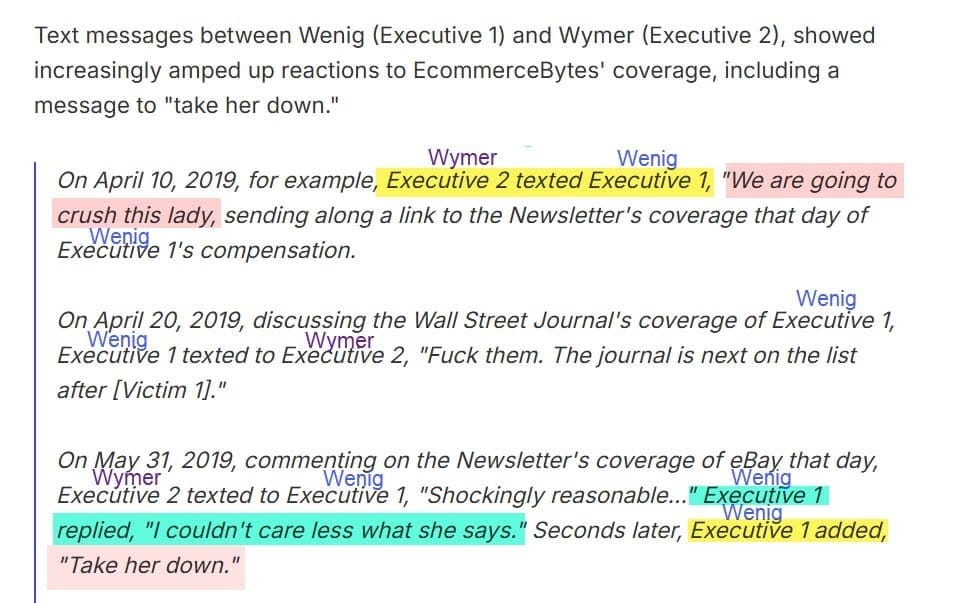
A shared desire with Wenig to "eff with" and diminish Ina Steiner.
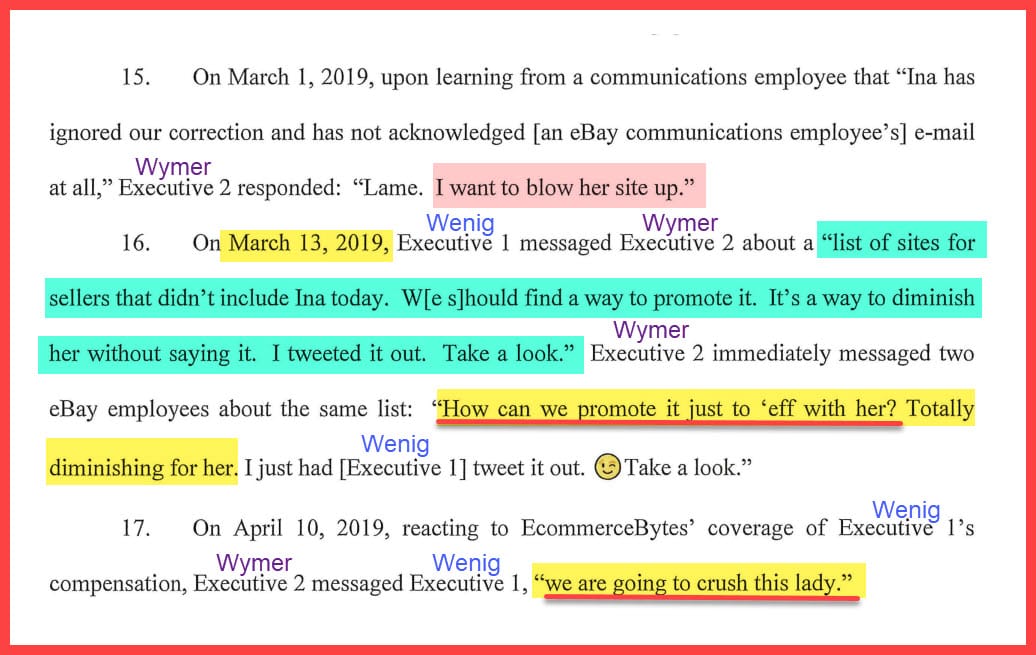
Text messages telling Baugh:
"Hatred is a sin, I am very sinful"...."She's a biased troll who needs to get BURNED DOWN."
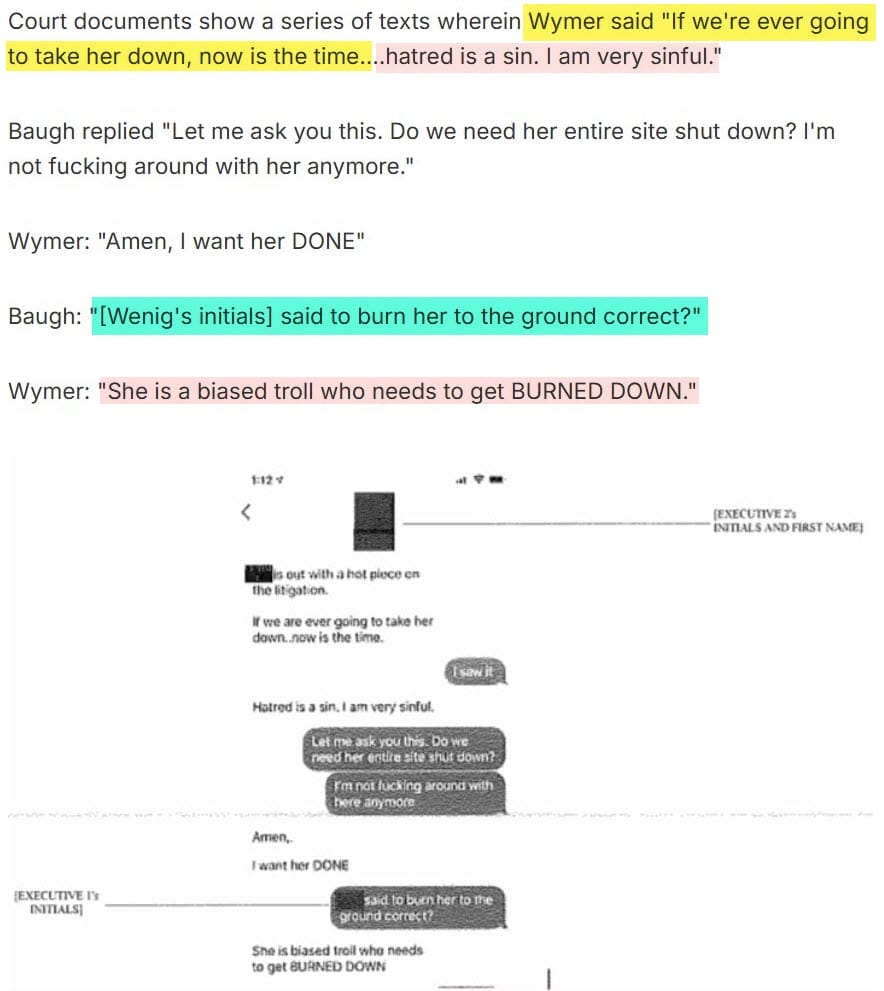
"Burn her down".... "I want to see ashes, as long as it takes, whatever it takes"
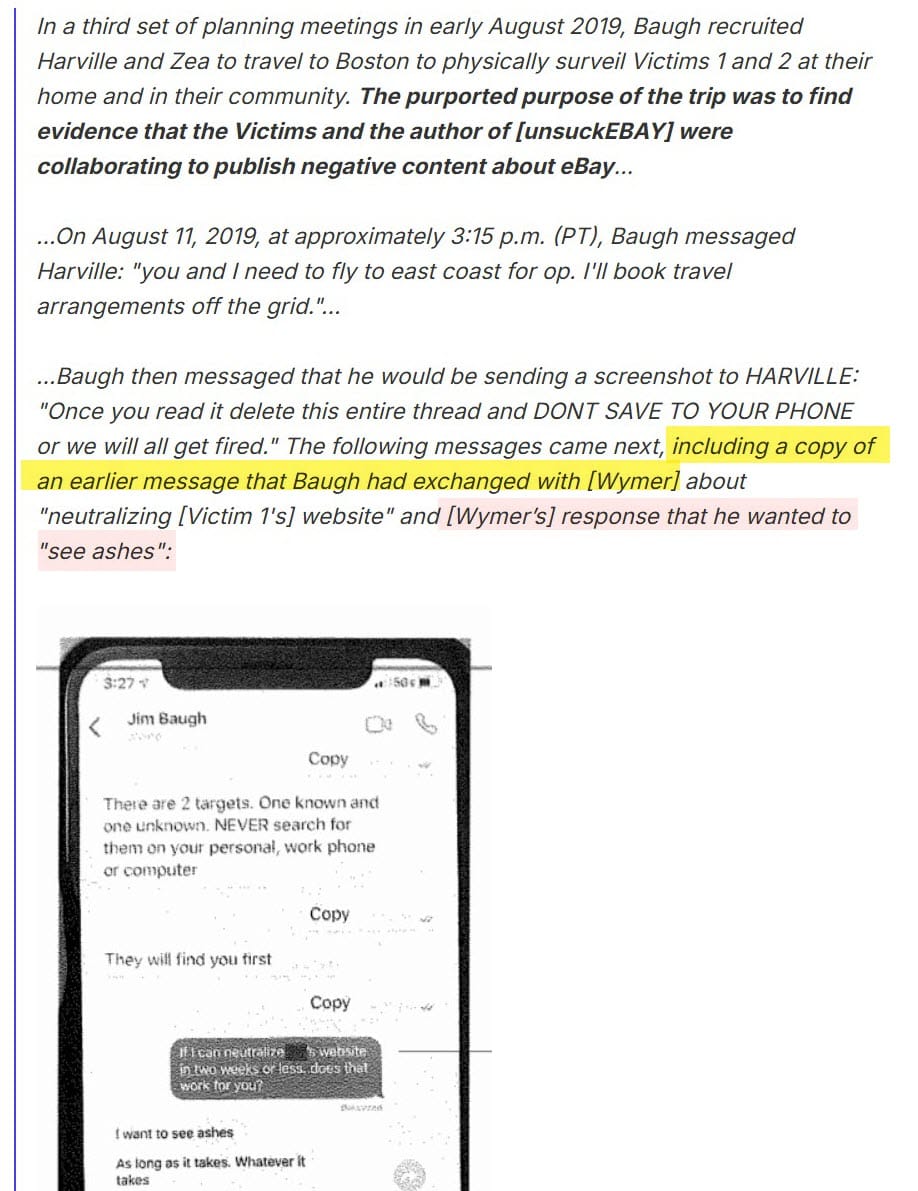
Jones' attorneys follow the same line of argument, saying the sentencing memos of the criminal defendants and the deferred prosecution agreement eBay signed with the DOJ are inadmissible hearsay.
Throughout their Opposition, Response to Ms. Jones’s Rule 56.1 Statement of Undisputed Facts, and Statement of Proposed Undisputed Facts, Plaintiffs rely on sentencing memoranda of several of the Security Group Defendants...
...For example, Plaintiffs’ use of Baugh’s sentencing memorandum is the very definition of hearsay. Plaintiffs rely on statements purportedly made to Baugh, who then conveyed those statements to his attorney, who then proffered the assertions in a sentencing memorandum. The Federal Rules of Evidence are designed to exclude precisely this kind of self-serving, prejudicial, and unreliable evidence.
Jones goes on to argue that even if Baugh's sentencing memo were admissible, it should not be accepted because it is not a reliable source - citing the fact that Baugh claimed an email asking to "huddle" on some issue over lunch was about EcommerceBytes when it was really about "safety issues" concerning a post about eBay's facilities on a contractor's website, according to Jones.
Further, Baugh’s sentencing memorandum, on its face, demonstrates that it is not a reliable source that can create a reasonable dispute of fact. For instance, Plaintiffs rely heavily on Baugh’s assertion that Ms. Jones asked Baugh to “huddle” on an issue involving EcommerceBytes.
But a screenshot of the actual message, included in Baugh’s sentencing memorandum, shows that Ms. Jones asked Russell Phimister—the then-Senior Director of Workplace Resources at eBay and Ms. Jones’s direct report—to “huddle” on the issue; Baugh was merely copied on the email..
Moreover, the issue Ms. Jones was concerned about did not relate to EcommerceBytes, and instead concerned safety issues involving a website post by a contractor at eBay’s campus....
...Plaintiffs cannot hide behind the suggestion that maybe, perhaps, they will elicit supporting testimony at trial. Plaintiffs made a tactical decision not to depose Mr. Baugh, despite an order from this Court allowing them to do so..
Nor did Plaintiffs depose Ms. Jones, who stated under oath in a sworn declaration that Plaintiffs’ allegations are false. Ms. Jones’s account is
undisputed..
While Jones is correct in pointing out Baugh was merely copied on the email, it's laughable to suggest this email had nothing to do with EcommerceBytes, as the subject line explicitly referred to Ina Steiner.

This request to "huddle" came on May 23, 2019 - 2 days after EcommerceBytes had published a story about CEO Devin Wenig turning a historic house on the eBay campus into a replica of his favorite NYC bar in 2017, which many viewed as a questionable use of corporate resources, especially considering the mass layoffs eBay had undertaken during that time.
unsuckEBAY/FidoMaster's amplification of the story on Twitter, and criticism of what he called Wenig's "self-indulgent vanity project", also caught eBay's attention, as shown by an email from Stephanie Stockwell to Jim Baugh dated May 22, 2019.
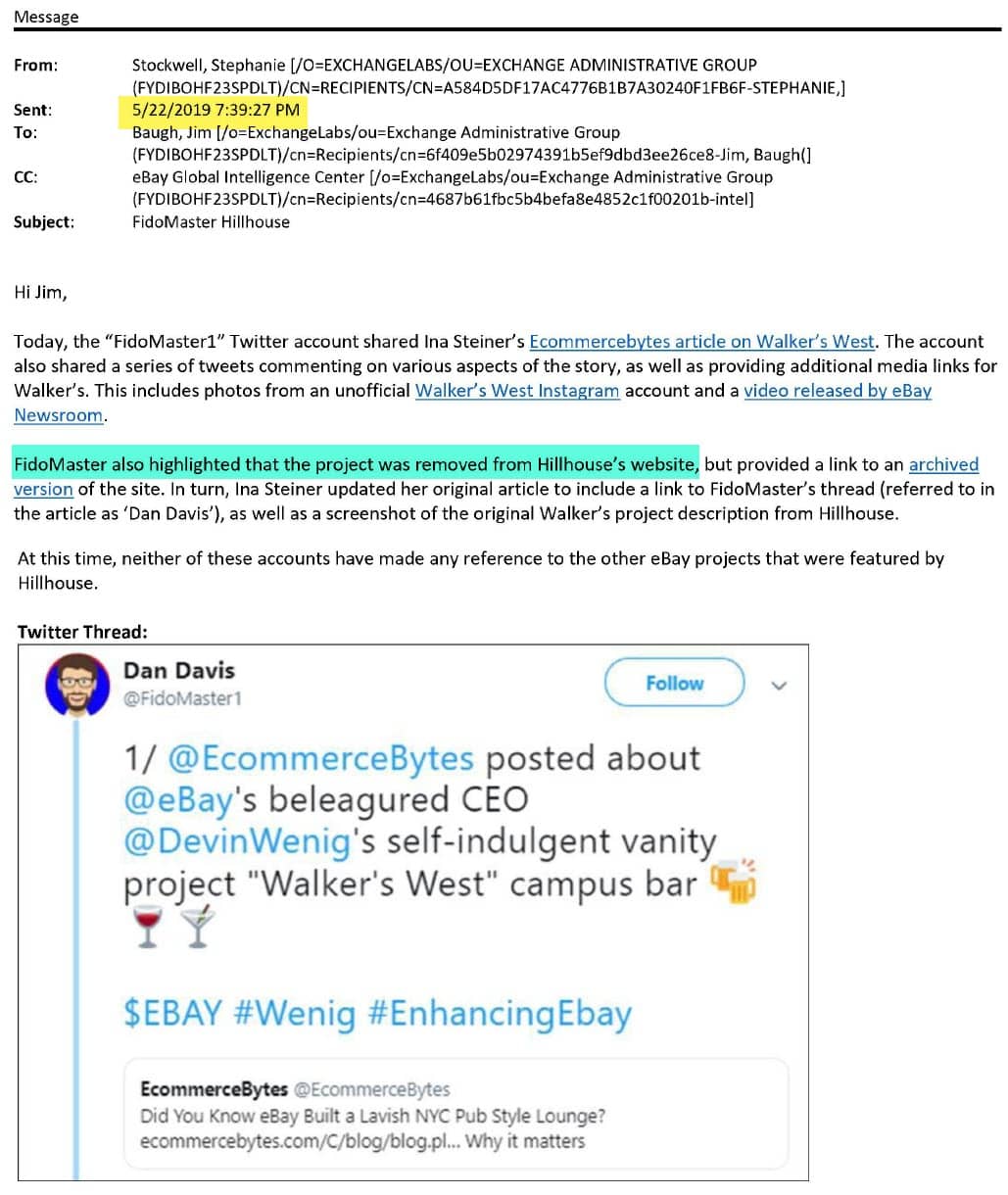
The email went on to show the full tweet thread, including EcommerceBytes responding to thank FidoMaster for flagging the fact that the details about Walker's West had been removed from the contractor's website, resulting in an update to the EcommerceBytes article dated May 22, 2019 - 1 day before Jones' request to "huddle."
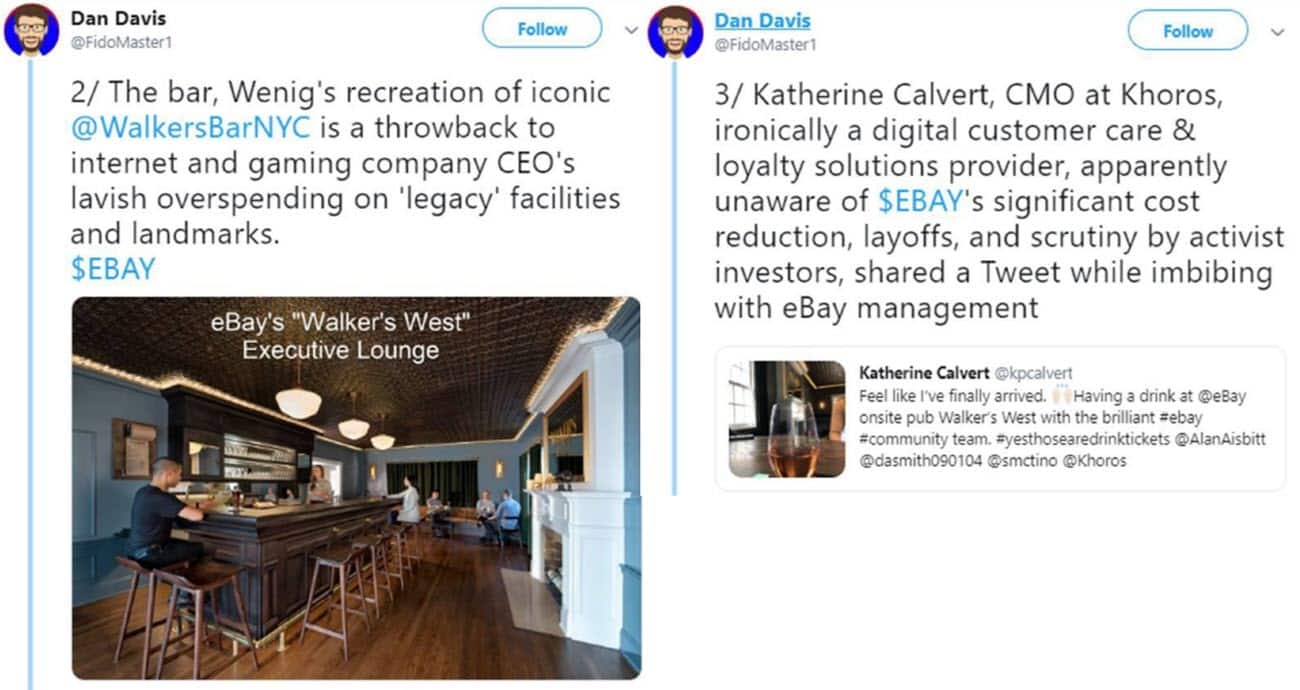
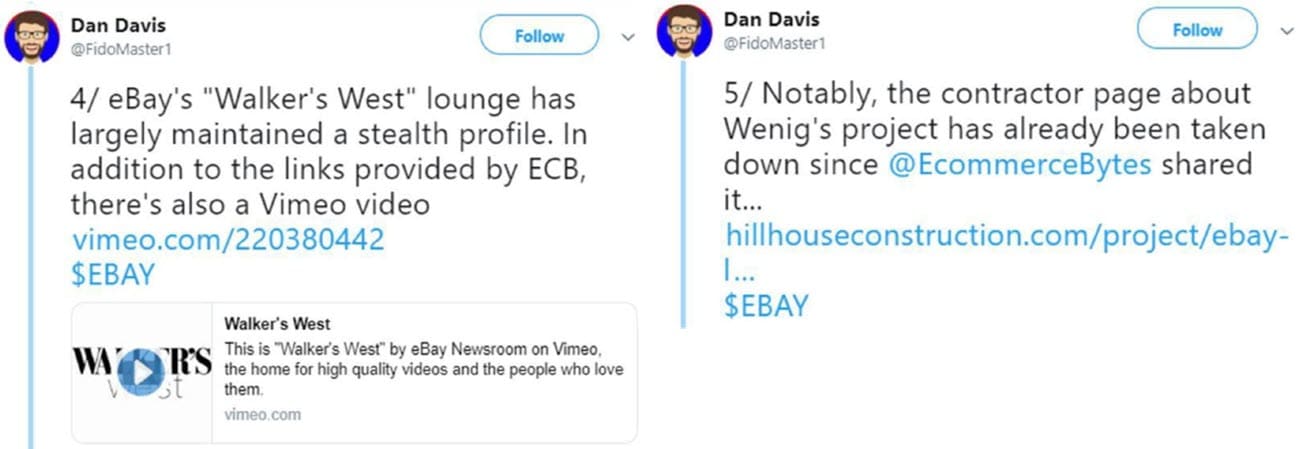
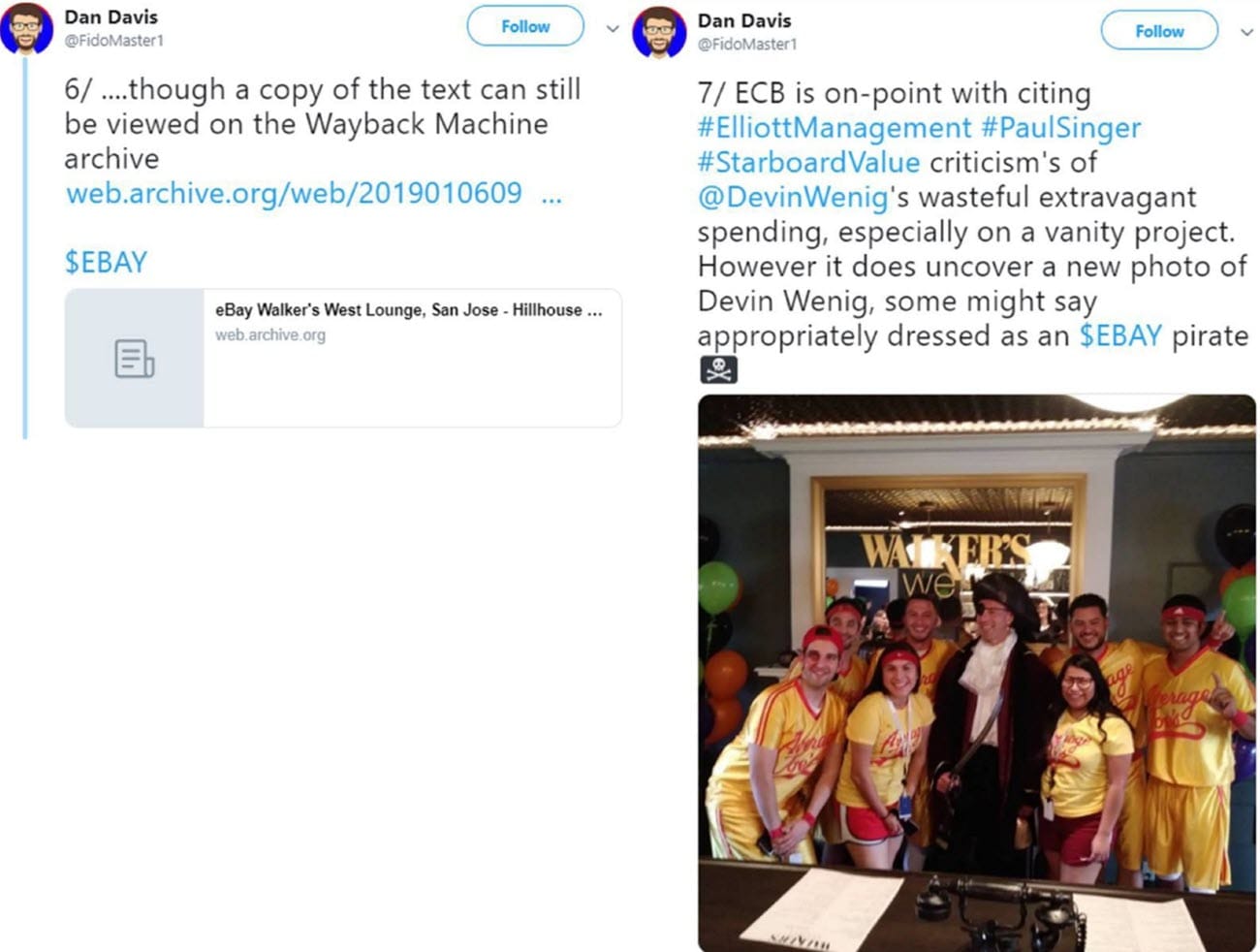
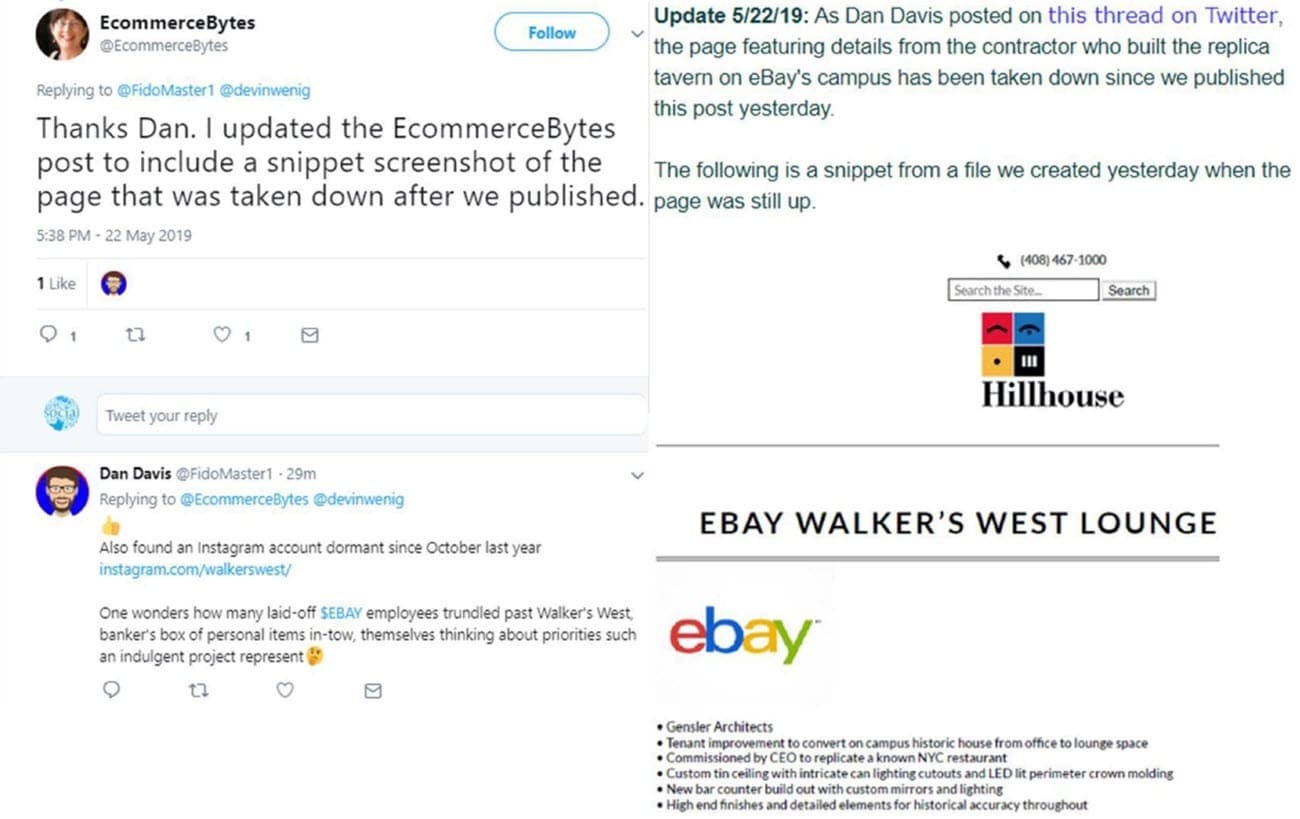
Why would Jones want to "huddle" about safety issues supposedly posed by information posted on the website of the contractor who did the Walker's West renovation when that information had already been removed from that site the day before?
Beyond that, how can Jones or eBay expect anyone to take the idea this was a security or safety concern seriously when Jones proudly appeared in a promotional video for the eBay Main Street project (which included renovating the historic "Little Blue House" into Walker's West)?
Culture Capital also posted a video in 2017 about the eBay Main Street project, including a short interview with Wenig.
The fact that eBay still hosts videos showing interior tours of the pub on their official Vimeo and YouTube channels belies any point the company might wish to make about supposed security threats from the details of the building being publicly available.
And current leadership is apparently not too concerned about any supposed security issues either, as the on campus pub continues to operate today - though it has been renamed The Sellar in an effort to distance eBay from the tarnished history of the project.

Baugh's sentencing memo alleges after the email request to huddle about the Walker's West story, Jones told Baugh to deal with the issue "off the radar":
At the lunch meeting, Jones asked Mr. Baugh if he could find a way to deal with the issue “off the radar since comms and legal couldn’t handle it.”
Jones told Mr. Baugh, “Just get it done. I don’t want to know the details, just make sure you sync with Wymer.” Mr. Baugh thereafter provided regular updates to Jones.
Source: USA v. Baugh 1:20-cr-10263 Doc 227
Jones denies those allegations and says those statements from Baugh's sentencing memo are inadmissible hearsay.
eBay's motion for summary judgement is slightly different as they are only seeking to stop some of the Steiners' claims before trial, arguing they have not made sufficient arguments for claims of defamation, ratification, or lost consulting fees and goodwill value of their business.
Plaintiffs contend that “eBay is not entitled to summary judgment on any of [their] claims,” yet they do not even attempt to defend several claims that are the subject of eBay’s motion.
They abandon 37 of the 47 allegedly defamatory statements identified in their interrogatory responses, addressing only 10 in their opposition. They say not a word about the $5 million in lost consulting fees they claim, and identify no competent evidence supporting the alleged $10 million in lost website value and goodwill.
And the claims Plaintiffs do address fare no better. Plaintiffs defend the remnant of their defamation claim with a mixture of speculation, legal error, and misdirection.
They identify no evidence creating a triable issue on the key element of the negligent retention claim: whether eBay knew or should have known of Baugh’s unfitness. They ignore and therefore waive one fatal defect of the false imprisonment claim, while citing no evidence creating a triable issue on another.
And they concede that ratification is not a standalone claim, and then proceed to defend the claim without addressing any of the undisputed evidence demonstrating eBay’s repudiation of the Natick events. The Court should grant eBay’s motion.
eBay and other named defendants are also seeking to exclude testimony and evidence from multiple experts brought in by the Steiners, including Dr. Adam Galinsky, saying Galinsky's "pseudoscientific testimony is not based on any reliable scientific method [and] relies on an improper use of 'social framework' analysis."
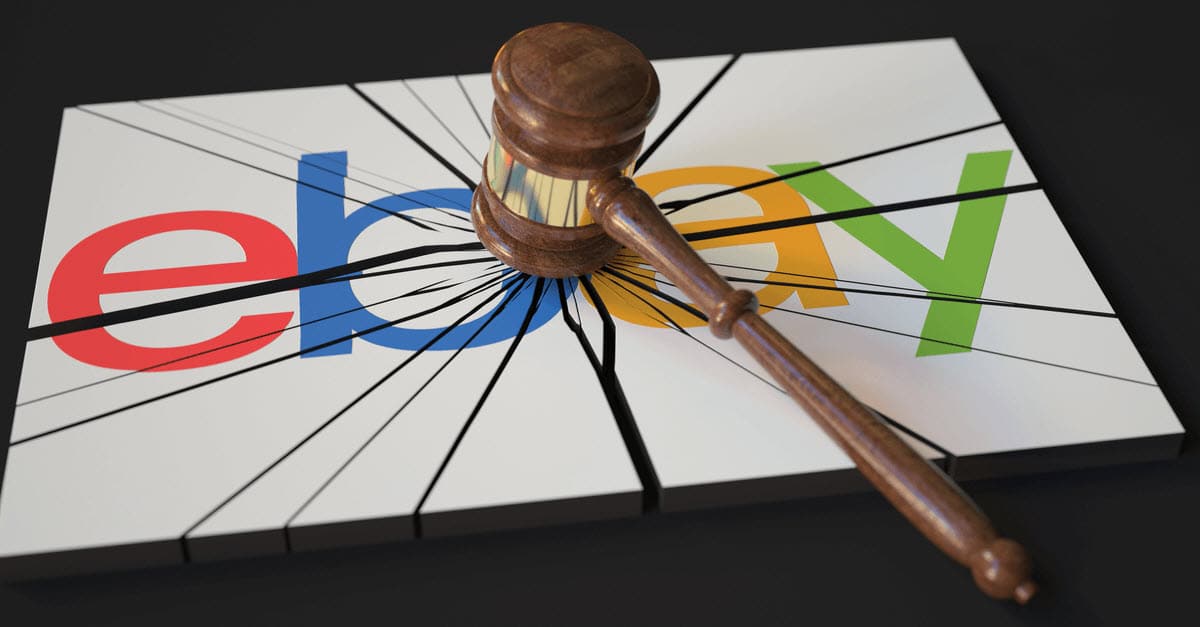
Judge Saris has set an in person hearing on the motions for summary judgement for March 10th.
While a tentative trial date was previously set for March of this year, that has since been pushed out to an unspecified time by delays and extensions - though it is still expected to happen sometime in 2025, assuming no settlement is reached.
Stay tuned for updates as the case continues and remember - VAR+ subscribers get exclusive access to the Value Added Resource eBay cyberstalking case document archive!




















